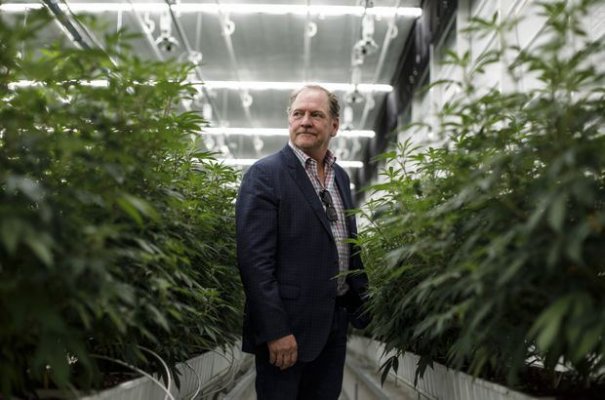Convinced that Canada could surf a wave of global cannabis legalization, Terry Booth built Aurora Cannabis into one of the world’s most highly valued pot producers—second only to arch-rival Canopy Growth. That was a year ago.
Since then, Canada’s pot stocks have collapsed under a glut of unsold weed, and late Thursday, Aurora (ticker: ACB) announced that Booth will immediately retire as his company tries to conserve cash by laying off 500 employees. Chairman Michael Singer will fill Aurora’s CEO slot until a new chief can be found. New terms from Aurora’s bank lenders now require the company to become cash-flow positive by the September quarter.
Rumors of layoffs and Booth’s resignation circulated all day Thursday and knocked 5.6% off the price of the stock, leaving it at $2 by the close.
“We’re positioning Aurora for sustainable long-term growth,” said Singer on Thursday’s 5 p.m. EST conference call, “but we need to manage our business for the realities of today’s market.” Booth didn’t speak on the call.
The company also preannounced poor results for its December quarter, with cannabis sales falling about 10% sequentially to between 62 and 66 million Canadian dollars (US$47 million-$50 million). And that’s before product returns and price cuts, which could reduce December’s net sales below C$54 million. After overhead costs of some C$100 million, Aurora will have a big loss in the quarter.
Worse yet, the company said it would take nearly C$1 billion in write-offs in the form of impairments of about C$200 million and up to C$775 million in goodwill write-downs. Complete results for the December quarter will be released next week.
Booth was preceded out the door by his No. 2 officer, Cam Battley, who stepped down in December. With Booth’s departure, Canada’s pot business has lost most of its pioneering entrepreneurs. Aphria (APHA) founder Vic Neufeld left in early 2019, after a short seller found that he held undisclosed interests in companies acquired by Aphria. In July, Canopy (CGC) made founder Bruce Linton walk the plank.
As Canada’s recreational sales of weed have disappointed expectations, leading producers discovered that they’d overbuilt production facilities and produced too much. Layoffs have rippled across the industry in recent weeks. On Tuesday, Tilray (TLRY) said it was cutting 10% of its workforce. Earlier cuts were announced by Canopy and HEXO (HEXO).
Aurora’s cannabis sales fell 25% from its June to September 2019 quarter, to C$71 million. On just the September quarter’s sales, however, the company burned through C$40 million in negative cash flow. Counting its hefty capital expenditures, its negative free cash flow was a whopping C$125 million for the quarter.
The shares of licensed producers have plunged more than 50%, on average, over the past year. Aurora shares are down 80% since their March 2019 peak at 10 bucks. Barron’s readers were well-warned.
Aurora was one of Canada’s biggest producers and its biggest disappointment. A former electrical contractor, Booth started building sprawling greenhouses for his venture while rivals were still writing business plans.
Booth’s custom-designed production facilities weren’t cheap, so Aurora became the first Big Weed client of the investment bankers at Canaccord Genuity Group (CF.Canada), raising hundreds of millions of dollars to fund millions of square feet of greenhouses.
Canaccord established an empire in cannabis banking, and Booth’s Aurora was the jewel in Canaccord’s crown. The investment dealer’s executives invested in Aurora for their own account, and it made fortunes for some of them.
With sell-side analysts predicting that marijuana usage would displace booze and tobacco, established companies in those sin sectors looked for beachheads. Canopy Growth secured a huge investment from the beer and wine producer Constellation Brands (STZ), while Cronos Group (CRON) got the backing of tobacco giant Altria Group (MO).
Aurora seemed left out of the alliance formation, so in early 2019 it brought onboard the activist investor Nelson Peltz with the mandate that he hook the company up with the consumer packaged-goods firms he knows so well. So far, no big deals have been announced.
Since then, Canada’s pot stocks have collapsed under a glut of unsold weed, and late Thursday, Aurora (ticker: ACB) announced that Booth will immediately retire as his company tries to conserve cash by laying off 500 employees. Chairman Michael Singer will fill Aurora’s CEO slot until a new chief can be found. New terms from Aurora’s bank lenders now require the company to become cash-flow positive by the September quarter.
Rumors of layoffs and Booth’s resignation circulated all day Thursday and knocked 5.6% off the price of the stock, leaving it at $2 by the close.
“We’re positioning Aurora for sustainable long-term growth,” said Singer on Thursday’s 5 p.m. EST conference call, “but we need to manage our business for the realities of today’s market.” Booth didn’t speak on the call.
The company also preannounced poor results for its December quarter, with cannabis sales falling about 10% sequentially to between 62 and 66 million Canadian dollars (US$47 million-$50 million). And that’s before product returns and price cuts, which could reduce December’s net sales below C$54 million. After overhead costs of some C$100 million, Aurora will have a big loss in the quarter.
Worse yet, the company said it would take nearly C$1 billion in write-offs in the form of impairments of about C$200 million and up to C$775 million in goodwill write-downs. Complete results for the December quarter will be released next week.
Booth was preceded out the door by his No. 2 officer, Cam Battley, who stepped down in December. With Booth’s departure, Canada’s pot business has lost most of its pioneering entrepreneurs. Aphria (APHA) founder Vic Neufeld left in early 2019, after a short seller found that he held undisclosed interests in companies acquired by Aphria. In July, Canopy (CGC) made founder Bruce Linton walk the plank.
As Canada’s recreational sales of weed have disappointed expectations, leading producers discovered that they’d overbuilt production facilities and produced too much. Layoffs have rippled across the industry in recent weeks. On Tuesday, Tilray (TLRY) said it was cutting 10% of its workforce. Earlier cuts were announced by Canopy and HEXO (HEXO).
Aurora’s cannabis sales fell 25% from its June to September 2019 quarter, to C$71 million. On just the September quarter’s sales, however, the company burned through C$40 million in negative cash flow. Counting its hefty capital expenditures, its negative free cash flow was a whopping C$125 million for the quarter.
The shares of licensed producers have plunged more than 50%, on average, over the past year. Aurora shares are down 80% since their March 2019 peak at 10 bucks. Barron’s readers were well-warned.
Aurora was one of Canada’s biggest producers and its biggest disappointment. A former electrical contractor, Booth started building sprawling greenhouses for his venture while rivals were still writing business plans.
Booth’s custom-designed production facilities weren’t cheap, so Aurora became the first Big Weed client of the investment bankers at Canaccord Genuity Group (CF.Canada), raising hundreds of millions of dollars to fund millions of square feet of greenhouses.
Canaccord established an empire in cannabis banking, and Booth’s Aurora was the jewel in Canaccord’s crown. The investment dealer’s executives invested in Aurora for their own account, and it made fortunes for some of them.
With sell-side analysts predicting that marijuana usage would displace booze and tobacco, established companies in those sin sectors looked for beachheads. Canopy Growth secured a huge investment from the beer and wine producer Constellation Brands (STZ), while Cronos Group (CRON) got the backing of tobacco giant Altria Group (MO).
Aurora seemed left out of the alliance formation, so in early 2019 it brought onboard the activist investor Nelson Peltz with the mandate that he hook the company up with the consumer packaged-goods firms he knows so well. So far, no big deals have been announced.




